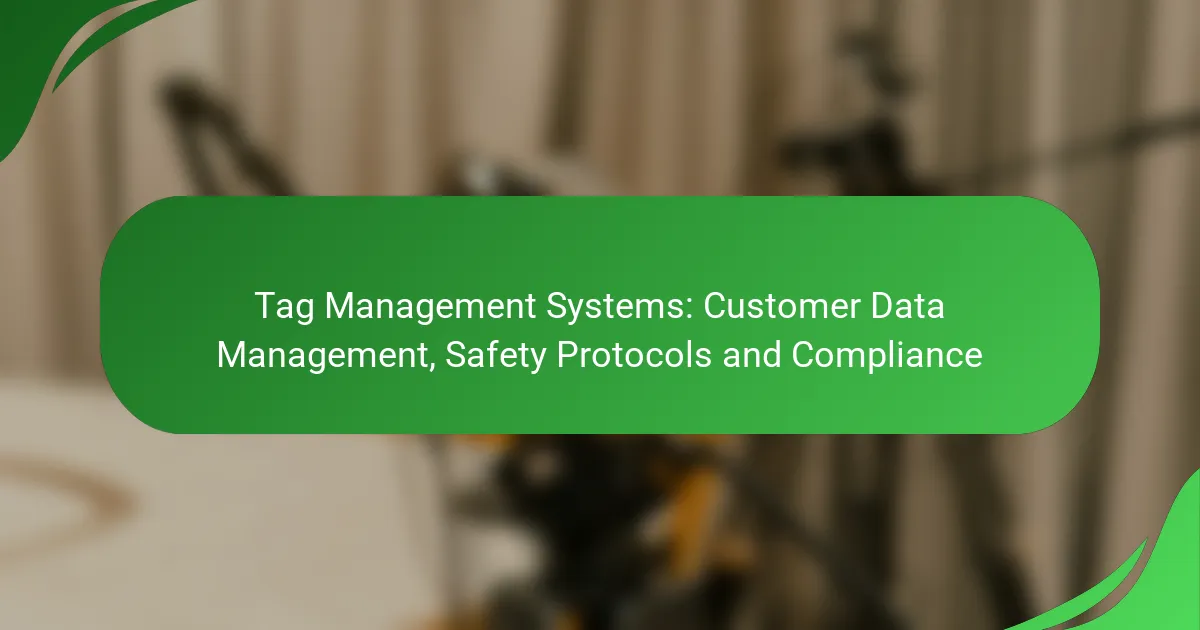Tag Management Systems (TMS) play a crucial role in helping organizations comply with the California Consumer Privacy Act (CCPA) by streamlining data collection and user consent processes. By prioritizing user privacy and transparent data practices, these systems not only ensure regulatory compliance but also enhance user trust through clear communication and control over personal data.

How do Tag Management Systems support CCPA compliance in Canada?
Tag Management Systems (TMS) assist organizations in Canada to comply with the California Consumer Privacy Act (CCPA) by streamlining data collection and user consent processes. They enable businesses to manage tags efficiently while ensuring that data handling practices align with privacy regulations.
Automated consent management
Automated consent management allows businesses to obtain, record, and manage user consent for data collection seamlessly. TMS can integrate with consent management platforms, ensuring that tags only fire when users have granted permission. This reduces the risk of non-compliance and builds user trust.
For instance, a TMS can automatically adjust the data collection settings based on the user’s consent status, ensuring compliance with CCPA requirements. This feature is crucial for businesses aiming to respect user privacy while still benefiting from data analytics.
Data access and deletion capabilities
Data access and deletion capabilities are essential for CCPA compliance, as users have the right to request access to their data and ask for its deletion. TMS can facilitate these processes by providing tools to easily locate and manage user data across various tags and platforms.
Organizations should implement a clear workflow for handling such requests, ensuring that they can respond within the required timeframe. Regular audits of data collection practices can help identify areas for improvement and ensure that all user data is managed appropriately.
Real-time compliance monitoring
Real-time compliance monitoring enables businesses to continuously track their adherence to CCPA regulations. TMS can provide dashboards and alerts that notify organizations of any compliance issues as they arise, allowing for immediate corrective action.
By leveraging analytics and reporting features, companies can assess their data practices regularly and ensure they remain compliant. This proactive approach not only mitigates risks but also enhances user confidence in how their data is handled.

What are the best Tag Management Systems for data protection?
The best Tag Management Systems (TMS) for data protection prioritize user privacy and compliance with regulations like the CCPA. These systems enable businesses to manage and deploy marketing tags while ensuring that data collection practices are transparent and secure.
Google Tag Manager
Google Tag Manager (GTM) is a widely used TMS that allows users to manage JavaScript and HTML tags for tracking and analytics without modifying the code directly. It supports data protection by enabling users to configure tags that respect user consent preferences, which is essential for compliance with regulations like the CCPA.
When using GTM, ensure that you implement triggers based on user consent status. This approach helps prevent unauthorized data collection and fosters user trust. Regularly audit your tags to ensure they align with current privacy standards and best practices.
Tealium iQ
Tealium iQ is a robust TMS that focuses on data privacy and compliance. It offers features such as consent management and data governance, which are crucial for organizations aiming to protect user data and comply with regulations like the CCPA.
Tealium iQ allows users to create a centralized data layer that can be easily managed and updated. This reduces the risk of data leakage and ensures that only compliant data is collected. Consider leveraging its built-in privacy features to streamline your compliance efforts and enhance user trust.
Adobe Launch
Adobe Launch is part of the Adobe Experience Cloud and provides a flexible TMS solution that emphasizes data protection and user privacy. It enables businesses to deploy tags while maintaining control over data collection practices, making it suitable for CCPA compliance.
With Adobe Launch, you can set up rules that dictate when and how data is collected based on user consent. This feature is vital for ensuring compliance and building trust with users. Regularly review your tag configurations to adapt to evolving privacy regulations and user expectations.

How can Tag Management Systems enhance user trust?
Tag Management Systems (TMS) can significantly enhance user trust by ensuring transparency in data practices and providing user-friendly consent interfaces. By prioritizing clear communication and control over personal data, businesses can foster a more trustworthy relationship with their users.
Transparent data practices
Transparent data practices involve openly sharing how user data is collected, used, and shared. This clarity helps users understand the value of their data and the measures taken to protect it. For example, a website might display a clear privacy policy that outlines data usage, which can reassure users about their information.
Implementing a TMS allows businesses to manage tags efficiently and ensure compliance with regulations like the CCPA. This compliance not only protects the business from legal repercussions but also builds user confidence when they see that their data is handled responsibly.
User-friendly consent interfaces
User-friendly consent interfaces are essential for gaining user approval for data collection. These interfaces should be intuitive, allowing users to easily opt in or out of data tracking. For instance, a simple toggle switch for consent can make the process straightforward and less intimidating for users.
Moreover, a well-designed consent interface can include clear explanations of what data is being collected and how it will be used. This transparency can lead to higher consent rates, as users feel more comfortable when they understand the implications of their choices. Regularly updating these interfaces based on user feedback can further enhance their effectiveness and user trust.

What criteria should be considered when selecting a Tag Management System?
When selecting a Tag Management System (TMS), consider integration capabilities, scalability, user-friendliness, and compliance with regulations like the CCPA. These criteria ensure that the TMS meets both current and future data management needs while maintaining user trust and data protection.
Integration capabilities
Integration capabilities are crucial when choosing a TMS, as they determine how well the system can connect with existing tools and platforms. Look for a TMS that supports a wide range of integrations with analytics, marketing, and content management systems. Popular options often provide pre-built connectors for major platforms like Google Analytics, Adobe Analytics, and various CRM systems.
Additionally, ensure that the TMS allows for custom integrations if your organization uses niche tools. This flexibility can save time and resources, enabling smoother data flows and more effective marketing strategies.
Scalability for future needs
Scalability is essential for a TMS to accommodate growth and evolving business requirements. A scalable TMS can handle increasing data volumes and additional tags without compromising performance. Look for systems that offer tiered pricing models, allowing you to upgrade as your needs expand.
Consider how easily the TMS can adapt to new technologies or changes in regulations, such as updates to the CCPA. A robust TMS should provide features that support future-proofing, such as automated updates and the ability to manage multiple domains or subdomains efficiently.

How do Tag Management Systems handle data breaches?
Tag Management Systems (TMS) manage data breaches by implementing robust security measures and protocols to minimize risks and respond effectively. These systems often include features for monitoring, alerting, and managing data access to protect sensitive information.
Incident response protocols
Incident response protocols in Tag Management Systems are designed to quickly identify and address data breaches. These protocols typically involve a series of steps, including detection, containment, eradication, recovery, and post-incident analysis. A well-defined response plan can significantly reduce the impact of a breach.
Organizations should regularly test their incident response protocols to ensure effectiveness. This may involve conducting simulated breaches to evaluate the response team’s readiness and refining the procedures based on lessons learned.
Data encryption standards
Data encryption standards are crucial for protecting sensitive information within Tag Management Systems. Implementing strong encryption methods, such as AES-256, can safeguard data both at rest and in transit, making it difficult for unauthorized parties to access it. Compliance with regulations like CCPA emphasizes the importance of encryption in maintaining user trust.
Organizations should regularly review and update their encryption practices to align with industry standards and emerging threats. This includes ensuring that encryption keys are managed securely and that outdated algorithms are replaced with more secure alternatives.

What are the emerging trends in Tag Management Systems?
Emerging trends in Tag Management Systems (TMS) focus on enhancing data analytics, privacy, and cross-platform capabilities. These advancements aim to improve user trust while ensuring compliance with regulations like the CCPA.
AI-driven analytics
AI-driven analytics in Tag Management Systems leverage machine learning to analyze user behavior and optimize marketing strategies. By processing large datasets, these systems can identify patterns and trends that human analysts might miss.
For instance, AI can predict user actions based on historical data, allowing businesses to personalize their marketing efforts effectively. This can lead to improved conversion rates and a better return on investment.
Enhanced privacy features
Enhanced privacy features are becoming crucial in Tag Management Systems, especially with regulations like the CCPA in place. These features help businesses manage user consent and data collection transparently, fostering trust with consumers.
For example, TMS can now include built-in consent management tools that allow users to easily opt-in or opt-out of data tracking. This not only complies with legal standards but also enhances the overall user experience.
Cross-platform tracking solutions
Cross-platform tracking solutions enable businesses to monitor user interactions across various devices and platforms seamlessly. This capability is essential for understanding the full customer journey and optimizing marketing efforts accordingly.
Tag Management Systems that support cross-platform tracking can integrate data from websites, mobile apps, and social media, providing a unified view of user behavior. This holistic approach allows for more effective targeting and engagement strategies.



